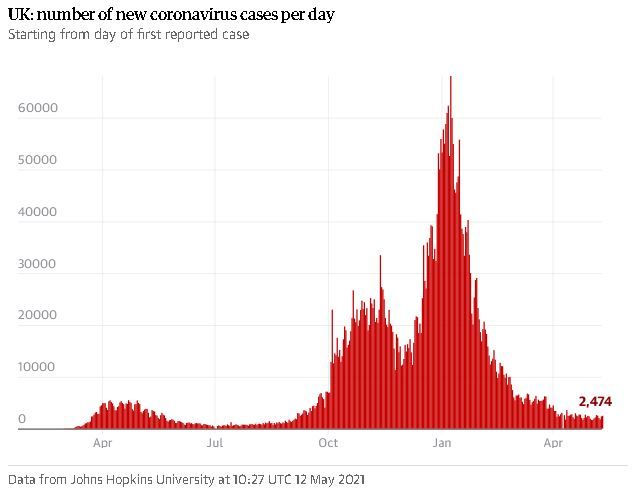PM announces full inquiry into UK’s handling of crisis will be ‘within this session’ – expected to be a year
Boris Johnson has for the first time put a loose timeframe on launching a full public inquiry into the government’s handling of the coronavirus crisis, saying it would start in this session of parliament.
A session is usually around a year, although it could be longer. One recent session lasted from 21 June 2017 to 8 October 2019.
“I do believe it’s essential we have a full, proper public inquiry into the Covid pandemic,” the prime minister said, in response to questioning from the leader of the Liberal Democrats, Ed Davey.
“I can certainly say that we will do that within this session,” Johnson told him.
But the pledge disappointed the bereaved who have been lobbying for a statutory inquiry to be launched this summer at the latest, insisting it is the government’s legal duty. If the current parliamentary session lasts until next summer, the inquiry could be launched in the first half of next year but not start hearings until autumn 2022.
The Covid-19 Bereaved Families for Justice Group, which instigated the wall of 150,000 hand-drawn hearts to remember the UK’s pandemic dead opposite the Houses of Parliament, also noted Johnson had not confirmed he would launch a statutory inquiry which would allow witnesses to be ordered to appear under subpoena and force written evidence to be produced.
“Learning lessons from the pandemic is critical to saving lives now and in the future,” the group said in a statement. “The prime minister knows that and he’s said as much. So why does he think it can wait? Who delays learning critical lessons that can save lives? We know that the majority of the public support an independent inquiry and that 72% of those that do, want one by the autumn, so the prime minister needs to get on with it like the British public want.”

Downing Street has repeatedly said there would be an independent inquiry “at the appropriate time” but Johnson has argued that the government is too busy to start now. Last month, government lawyers told the bereaved that “the very people who would need to give evidence to an inquiry are working round the clock” and were likely to be too occupied for months to come.
A public inquiry into Covid is likely to be one of the most wide-ranging ever undertaken, but public support has been high. A poll conducted for the Guardian in March found 47% of people said they supported a public inquiry which has legal powers to compel people to give evidence under oath. Only 18% said they were opposed.
Its themes are likely to include the country’s readiness, the timing of lockdowns, protection of care homes, the disproportionate impact on ethnic minority people, supplies of PPE, the functioning of NHS test and trace, control of borders and handling of scientific advice.
Two weeks ago, the highly respected Institute for Government thinktank, whose leadership includes the former Tory cabinet minister David Lidington, said an inquiry should be launched at the start of this new session of parliament with hearings to start in September. The King’s Fund, the leading health thinktank, also said: “Now is the time.”
The archbishop of Canterbury, Justin Welby, is among faith leaders demanding a statutory public inquiry.
Labour has previously called for inquiry preparations to begin so it can start in earnest as soon as lockdown measures are lifted, which is scheduled to happen on 21 June. Other supporters of a full public inquiry include the government scientific adviser Prof John Edmunds, the head of the civil service under David Cameron, Bob Kerslake, the Royal College of Nursing and the British Medical Association.















